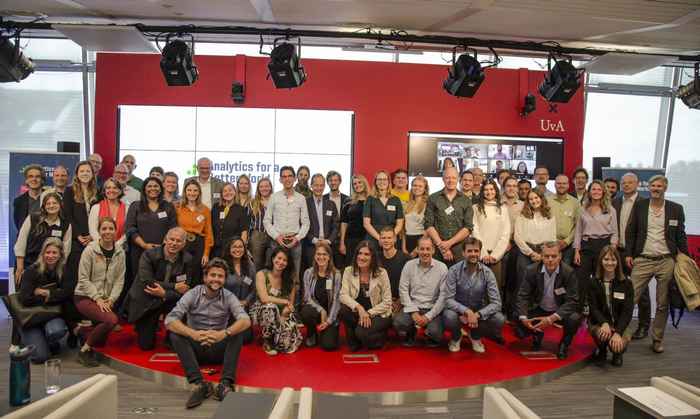Analytics for a Better World: celebrating a year of collaboration, community and impact
7 June 2023

The day started with a hearty welcome by Marc Salomon, Dean of the ABS and ABW founder: 'Many researchers working with us want to contribute to the SDGs. An initiative like ABW offers a great possibility to do so. Furthermore, we see that our students highly appreciate the related analytics course Dick den Hertog teaches with his ABW colleagues.'
Collaborative Achievements towards the SDGs
A year ago the Amsterdam Business School and ORTEC embarked upon an ambitious journey with a clear mission: to apply analytics to contribute to the Sustainable Development Goals (SDGs). The cornerstone of ABW's impact is rooted in the spirit of collaboration. 3 key stakeholders: researchers, businesses and non-profit organisations each bring a unique piece to the puzzle. Researchers from UvA Economics and Business and other universities provide innovative insights, develop prototypes and teach analytical skills. Businesses like ORTEC help apply analytics in practice by bringing the expertise and muscle to implement and deliver. This way, non-profits that face challenges worth solving can increase their impact through the power of analytics.
Analytics Research, Implementation and Knowledge Sharing
ABW’s approach intertwines analytics research, implementation and knowledge sharing. The ideal scenario is when these activities combine as in the work with The Ocean Cleanup. ABW Director Robert Monné points out: ‘'The Ocean Cleanup has people in the ABW academy, we’re running a joint research project and a software implementation project.' This multifaceted approach illustrates the potential and synergies of the ABW model to boost impactful change.

Keynote cases The Ocean Cleanup & 510
Head of Technology Arjen Tjallema explains how The Ocean Cleanup uses advanced analytics in their mission to remove 90% of floating plastic by the year 2040. Already having removed over 200,000 kg of plastic debris at the Great Pacific Garbage Patch between Hawaii and California so far, Arjen shares the impact case. Together with ABW the Ocean Cleanup works on optimization of vessel routes and fleet operations. Tjallema: ‘'ABW supports us with finding the most efficient approach by making an integrated model, forecasting what the effects will be in future operations'.
Wessel de Jong of the Netherlands Red Cross initiative 510 shares how they apply AI for automated damage assessment after disasters. By using high-resolution satellite images, AI models detect buildings and classify building damage. These assessments provide emergency responders insights which areas are impacted most.
Scaling Impact
As CTO Parvathy Krishnan points out, the ABW academy is set up to develop strategic and tailored courses for Analytics Practitioners within non-profit organisations. They provide free courses to a cohort of participants who join the three structured courses offered yearly. A curated ABW online repository of tools supports non-profits around the globe. These resources help in using data and digital in their operations, planning and project implementation. Last year ABW trained 69 non-profit employees on applying analytics in their work. ABW currently runs 12 implementation projects, 15 ongoing research projects and delivers 8 projects with components from the open-source repository.

From Science to Impact
Chaired by Dick den Hertog, Professors Hein Fleuren (Zero Hunger Lab and Tilburg University), Dimitris Bertsimas (MIT) and Luk Van Wassenhove (INSEAD) shed their light on the topic ‘’From Science to Impact’’. An inspiring closing panel about the importance of understanding the context, the art of listening and focusing on the right question. Final take-away? Human connection is key in impact creation. ‘’Engage people and make them owners’’.
About Analytics for a Better World
The Analytics for a Better World institute is a non-profit collaboration between the University of Amsterdam and ORTEC.